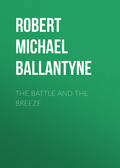
Robert Michael Ballantyne
The Fugitives: The Tyrant Queen of Madagascar
“I incline to the same course,” said Mark, “for my—well, I won’t say who, is awaiting me there also.”
“Unless she’s falled in lub wid some one else, tinkin’ you was dead, massa, you know,” suggested Ebony.
“Ditto, says I,” answered Hockins, when appealed to, “for, to the best o’ my belief, my old ooman is awaitin’ for me, too, over there—he pointed to England with the stem of his pipe—to say nothin’ o’ three thumpin’ boys an’ a gal—also an old gran’-mother an’ a maiden aunt, etceterer—all awaitin’ with great patience, I have no manner o’ doubt.”
“But how’s we to git dar? Das de question; as Hamblit said to his moder’s ghost.”
The question was answered sooner than they expected, for while they were yet speaking, a summons came from the King commanding the immediate attendance of the Court Physician. The object was to offer Mark his appointment permanently, but Mark respectfully, yet firmly, declined the honour.
“I feared that,” said the King, “for I doubt not that you has friends in your native home which draws you. Well, you wishes to go. I say, ‘Go with my good-will.’ There is Breetish ship loading at Tamatave now. If you and you’s friends mus’ go, there be your chance, and I will send you to Tamatave in palanquins. We all very sorry you go, for you was useful to us, and you was be kind—to my mother!”
Of course Mark gladly availed himself of the opportunity, thankfully accepted the king’s offer, and went off to inform his comrades and make preparation.
It was a sad occasion when they met in the house of their old guide Ravonino, to spend the last evening with him and Rafaravavy, and Laihova, and Ra-Ruth, Reni-Mamba and her husband, Voalavo, Soa, Totosy, the Secretary, and other friends, but it was also a time of pleasant communing about days that seemed so long past, although so recent. They also communed of days to come, and especially of that great day of reunion in the Better Land. And intensely earnest was the final prayer of the native pastor Totosy, as he commended his friends to the loving care of God.
Next day they set sail for the seaport town of Tamatave.
And here we might appropriately terminate our narrative, for the bright days that had begun to dawn on Madagascar have never since been darkened by persecution—though they have not been altogether cloudless or free from the curse of war; for, with its enormous capacities and important position, the island has long been a morsel coveted by some of what men style the “Great Powers.”
But we may not close our tale without at least touching on one dark spot, the contemplation of which cannot fail to grieve the heart of every sincere Christian. Rakota, the gentle, humane, courageous Prince, who had always favoured, and suffered hardship for, the cause of Christ, who had shielded and saved many of the Christians at the risk of his own life, and seemed to be—indeed was—a very pillar in the infant church, Rakota fell into gross sin and ultimately perished by the assassin’s hand.
We have no right to judge him. Only this we know, that “the blood of Jesus Christ cleanseth from all sin;” and if his life and death throw light upon any passage of Scripture, they seem to bring out in strong relief the words, “Let him that thinketh he standeth take heed lest he fall.”
It was a bright breezy morning when our three heroes stood on the deck of a homeward-bound vessel and gazed wistfully over the taffrail at the fast-receding shore. When the island sank like a little cloud into the horizon and disappeared, Mark and Ebony turned their eager eyes in the direction of old England, as if they half expected that celebrated isle of the west to appear! Possibly the one was thinking of a fair one with golden hair and blue eyes and a rosebud mouth. It is not improbable that the other was engaged in mental contemplation of a dark one with “a flat nose, and a coal-scuttle mout’, an’ such eyes!” As for Hockins, he stood with his sea-legs wide apart, his hands in his breeches pockets, and his eyes frowning severely at the deck. Evidently his thoughts, whether of past, present, or future, were too deep for utterance, for, like his comrades, he maintained unbroken silence.
Leaving them thus in pensive meditation, we regretfully bid them—and our readers—farewell!







